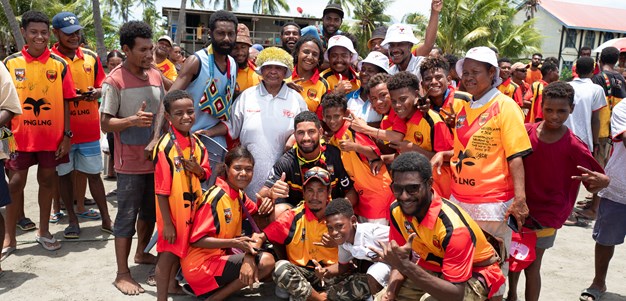The NRL has a desire to support players beyond their on-field careers through an investment in education and other programs, as outlined in the 2014 Annual Report released today.
The NRL is now spending more than ever before on welfare and education programs, and invested more than $7 million in this area in 2014. There were 514 individual grants in 2014 to players, totalling $630,000.
Over 78 per cent of NRL and NYC players are now in various education and career training programs and there are also welfare and education officers at every club providing a variety of support services.
NRL.com recently spoke with experienced Wests Tigers forward Dene Halatau about some of his off-field commitments in this area.
Halatau's work with the NRL over the past four years in welfare and education has included some work with a program called 'Trade up with the NRL', which runs with government assistance and provides qualified mentors to work with clubs, helping apprentices to complete their apprenticeships.
"It is a mentoring program for apprentices and trainees – not just in football but in our local area," Halatau said.
"I've been working with [Wests Tigers welfare co-ordinator] Steve Lavers to go out and see a group of apprentice motor mechanics. I do a bit of work with them, passing on a bit of stuff that we've worked on at the NRL."
NRL Apprentice Mentoring Program Manager John Hutchinson, who manages the 'Trade Up' program at the NRL, provides workshops that mentors can push to apprentices to boost the success rate.
"There are also the rookie camps with the NYC; I do that every year to help with the alcohol awareness program. I'd like to keep doing that sort of stuff outside of the playing commitments and hopefully when footy's done there are some roles for me to take up there," Halatau added.
Halatau said things had become a lot better in recent times in terms of the focus on post-playing careers and ensuring players are aware of the importance of developing other skills from a younger age through things like rookie camps.
"They try and make sure that guys are really aware of it at a young age and working and studying while they're playing. Football can come to an end pretty quickly and they want to be prepared for that transition.
"I've seen a lot of guys that get towards the end and all of a sudden they've got to jump into the real world work force and they're starting from day dot whereas a 30-year-old that's been in the workforce for 10 to 12 years has put the legwork in already and are a lot further ahead. I think guys are pretty proactive in trying to make sure the transition's pretty smooth."
More information on the NRL's welfare and education programs can be found in the 2014 Annual Report.

